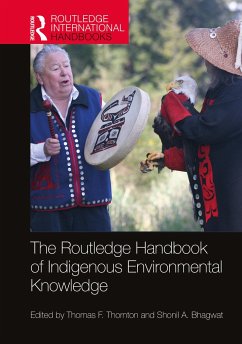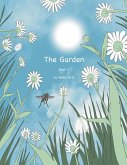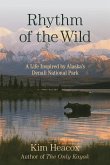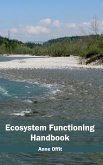The Routledge Handbook of Indigenous Environmental Knowledge
Herausgeber: Thornton, Thomas F.; Bhagwat, Shonil A.
The Routledge Handbook of Indigenous Environmental Knowledge
Herausgeber: Thornton, Thomas F.; Bhagwat, Shonil A.
- Broschiertes Buch
- Merkliste
- Auf die Merkliste
- Bewerten Bewerten
- Teilen
- Produkt teilen
- Produkterinnerung
- Produkterinnerung
The volume provides an overview of key themes in Indigenous Environmental Knowledge (IEK) and anchors them with brief but well-grounded relevant empirical case studies for each of these themes, drawn from bioculturally diverse areas around the world. It provides an incisive, cutting-edge overview of the conceptual and philosophical issues.
Andere Kunden interessierten sich auch für
![The Earth, Humanity and God The Earth, Humanity and God]() Colin A. RussellThe Earth, Humanity and God33,99 €
Colin A. RussellThe Earth, Humanity and God33,99 €![Fossil Sponge Spicules From The Upper Chalk Fossil Sponge Spicules From The Upper Chalk]() George Jennings HindeFossil Sponge Spicules From The Upper Chalk24,99 €
George Jennings HindeFossil Sponge Spicules From The Upper Chalk24,99 €![The Little Fun Book of Birds/Grass The Little Fun Book of Birds/Grass]() John HodgsonThe Little Fun Book of Birds/Grass17,99 €
John HodgsonThe Little Fun Book of Birds/Grass17,99 €![The Garden Part 1 The Garden Part 1]() Adam ArisThe Garden Part 115,99 €
Adam ArisThe Garden Part 115,99 €![Rhythm of the Wild Rhythm of the Wild]() Kim HeacoxRhythm of the Wild20,99 €
Kim HeacoxRhythm of the Wild20,99 €![Handbook of Biosphere Handbook of Biosphere]() Handbook of Biosphere153,99 €
Handbook of Biosphere153,99 €![Ecosystem Functioning Handbook Ecosystem Functioning Handbook]() Ecosystem Functioning Handbook155,99 €
Ecosystem Functioning Handbook155,99 €-
-
-
The volume provides an overview of key themes in Indigenous Environmental Knowledge (IEK) and anchors them with brief but well-grounded relevant empirical case studies for each of these themes, drawn from bioculturally diverse areas around the world. It provides an incisive, cutting-edge overview of the conceptual and philosophical issues.
Hinweis: Dieser Artikel kann nur an eine deutsche Lieferadresse ausgeliefert werden.
Hinweis: Dieser Artikel kann nur an eine deutsche Lieferadresse ausgeliefert werden.
Produktdetails
- Produktdetails
- Verlag: Routledge
- Seitenzahl: 428
- Erscheinungstermin: 30. November 2020
- Englisch
- Abmessung: 246mm x 174mm x 23mm
- Gewicht: 758g
- ISBN-13: 9781138280915
- ISBN-10: 1138280917
- Artikelnr.: 61649098
- Herstellerkennzeichnung
- Libri GmbH
- Europaallee 1
- 36244 Bad Hersfeld
- gpsr@libri.de
- Verlag: Routledge
- Seitenzahl: 428
- Erscheinungstermin: 30. November 2020
- Englisch
- Abmessung: 246mm x 174mm x 23mm
- Gewicht: 758g
- ISBN-13: 9781138280915
- ISBN-10: 1138280917
- Artikelnr.: 61649098
- Herstellerkennzeichnung
- Libri GmbH
- Europaallee 1
- 36244 Bad Hersfeld
- gpsr@libri.de
Thomas F. Thornton is Dean of Arts and Sciences and Vice-Provost for Research and Sponsored Programs at University of Alaska Southeast, USA, and Associate Professor (part-time) at the Environmental Change Institute, School of Geography and the Environment, University of Oxford, UK. Shonil A. Bhagwat is Professor of Environment and Development, and Head of the School of Social Sciences and Global Studies at the Open University, UK. His research focuses on the links between environment and development in the context of global challenges.
1 Introduction PART I Concepts and context 2 Indigenous Ecological
Knowledge: Why bother? 3 Context matters: the holism and subjectivity of
environmental knowledge 4 Cultivar diversity and management as traditional
environmental knowledge 5 On serving salmon: an ethnography of
hyperkeystone interactions in Interior Alaska 6 Performance knowledge:
uncovering the dynamics of biocultural diversity of Borneo's tropical
forests through a Penan hunting technique 7 Soil ethnoecology 8 Bridging
paradigms: analyzing traditional Tsimane' hunting with a double lens PART
II Issues of perspective, values, and engagement 9 Asian and Middle Eastern
pastoralists 10 Balance on every ledger: Kwakwaka'wakw resource values and
traditional ecological management 11 Challenges surrounding education and
transmission of Ainu Indigenous Ecological Knowledge in Japan: disparate
valuations of a people and their IEK 12 Engaging with Indigenous
Environmental Knowledge in the North American Arctic: moving from
documentation to decisions in environmental governance 13 Taiga Forest
reindeer herders and hunters, subsistence, stewardship 14 Tlingit
engagement with salmon: the philosophy and practice of relational
sustainability 15 M¿tauranga as knowledge, process and practice in Aotearoa
New Zealand PART III Applications of IEK for adaptation, conservation, and
coexistence 16 Integrating Amazigh cultural practices in Moroccan High
Atlas biodiversity conservation 17 Sacred groves of Sierra Leone:
preserving Indigenous Environmental Knowledge 18 The role of biodiversity
in the maintenance of ecosystem services in human-dominated landscapes:
evidence from the Terai Plains of Nepal 19 Creating coexistence:
traditional knowledge and institutions as a foundation for Maasai-wildlife
coexistence in southern Kenya 20 Cultural keystone species as indicators of
climatic changes 21 Living with elephants: indigenous world-views 22 Do
dragons prevent deforestation?: The Gambia's sacred forests 23 Fire, native
ecological knowledge, and the enduring anthropogenic landscapes of Yosemite
Valley PART IV Governance and equity 24 Who benefits? Indigenous
Environmental Knowledge (IEK) in multilateral biodiversity agreements 25
The use and misuse of IEK in conservation in Vietnam 26 Including
Indigenous and Local Knowledge in the work of the Intergovernmental
Science-Policy Platform on Biodiversity and Ecosystem Services (IPBES)
Global Assessment: outcomes and lessons for the future 27 Indigenous
Knowledge, knowledge-holders and marine environmental governance 28
Incorporating social-ecological systems into protected area networks:
indigenous and Community Conserved Areas (ICCAs) in Sabah, Malaysian Borneo
Knowledge: Why bother? 3 Context matters: the holism and subjectivity of
environmental knowledge 4 Cultivar diversity and management as traditional
environmental knowledge 5 On serving salmon: an ethnography of
hyperkeystone interactions in Interior Alaska 6 Performance knowledge:
uncovering the dynamics of biocultural diversity of Borneo's tropical
forests through a Penan hunting technique 7 Soil ethnoecology 8 Bridging
paradigms: analyzing traditional Tsimane' hunting with a double lens PART
II Issues of perspective, values, and engagement 9 Asian and Middle Eastern
pastoralists 10 Balance on every ledger: Kwakwaka'wakw resource values and
traditional ecological management 11 Challenges surrounding education and
transmission of Ainu Indigenous Ecological Knowledge in Japan: disparate
valuations of a people and their IEK 12 Engaging with Indigenous
Environmental Knowledge in the North American Arctic: moving from
documentation to decisions in environmental governance 13 Taiga Forest
reindeer herders and hunters, subsistence, stewardship 14 Tlingit
engagement with salmon: the philosophy and practice of relational
sustainability 15 M¿tauranga as knowledge, process and practice in Aotearoa
New Zealand PART III Applications of IEK for adaptation, conservation, and
coexistence 16 Integrating Amazigh cultural practices in Moroccan High
Atlas biodiversity conservation 17 Sacred groves of Sierra Leone:
preserving Indigenous Environmental Knowledge 18 The role of biodiversity
in the maintenance of ecosystem services in human-dominated landscapes:
evidence from the Terai Plains of Nepal 19 Creating coexistence:
traditional knowledge and institutions as a foundation for Maasai-wildlife
coexistence in southern Kenya 20 Cultural keystone species as indicators of
climatic changes 21 Living with elephants: indigenous world-views 22 Do
dragons prevent deforestation?: The Gambia's sacred forests 23 Fire, native
ecological knowledge, and the enduring anthropogenic landscapes of Yosemite
Valley PART IV Governance and equity 24 Who benefits? Indigenous
Environmental Knowledge (IEK) in multilateral biodiversity agreements 25
The use and misuse of IEK in conservation in Vietnam 26 Including
Indigenous and Local Knowledge in the work of the Intergovernmental
Science-Policy Platform on Biodiversity and Ecosystem Services (IPBES)
Global Assessment: outcomes and lessons for the future 27 Indigenous
Knowledge, knowledge-holders and marine environmental governance 28
Incorporating social-ecological systems into protected area networks:
indigenous and Community Conserved Areas (ICCAs) in Sabah, Malaysian Borneo
1 Introduction PART I Concepts and context 2 Indigenous Ecological
Knowledge: Why bother? 3 Context matters: the holism and subjectivity of
environmental knowledge 4 Cultivar diversity and management as traditional
environmental knowledge 5 On serving salmon: an ethnography of
hyperkeystone interactions in Interior Alaska 6 Performance knowledge:
uncovering the dynamics of biocultural diversity of Borneo's tropical
forests through a Penan hunting technique 7 Soil ethnoecology 8 Bridging
paradigms: analyzing traditional Tsimane' hunting with a double lens PART
II Issues of perspective, values, and engagement 9 Asian and Middle Eastern
pastoralists 10 Balance on every ledger: Kwakwaka'wakw resource values and
traditional ecological management 11 Challenges surrounding education and
transmission of Ainu Indigenous Ecological Knowledge in Japan: disparate
valuations of a people and their IEK 12 Engaging with Indigenous
Environmental Knowledge in the North American Arctic: moving from
documentation to decisions in environmental governance 13 Taiga Forest
reindeer herders and hunters, subsistence, stewardship 14 Tlingit
engagement with salmon: the philosophy and practice of relational
sustainability 15 M¿tauranga as knowledge, process and practice in Aotearoa
New Zealand PART III Applications of IEK for adaptation, conservation, and
coexistence 16 Integrating Amazigh cultural practices in Moroccan High
Atlas biodiversity conservation 17 Sacred groves of Sierra Leone:
preserving Indigenous Environmental Knowledge 18 The role of biodiversity
in the maintenance of ecosystem services in human-dominated landscapes:
evidence from the Terai Plains of Nepal 19 Creating coexistence:
traditional knowledge and institutions as a foundation for Maasai-wildlife
coexistence in southern Kenya 20 Cultural keystone species as indicators of
climatic changes 21 Living with elephants: indigenous world-views 22 Do
dragons prevent deforestation?: The Gambia's sacred forests 23 Fire, native
ecological knowledge, and the enduring anthropogenic landscapes of Yosemite
Valley PART IV Governance and equity 24 Who benefits? Indigenous
Environmental Knowledge (IEK) in multilateral biodiversity agreements 25
The use and misuse of IEK in conservation in Vietnam 26 Including
Indigenous and Local Knowledge in the work of the Intergovernmental
Science-Policy Platform on Biodiversity and Ecosystem Services (IPBES)
Global Assessment: outcomes and lessons for the future 27 Indigenous
Knowledge, knowledge-holders and marine environmental governance 28
Incorporating social-ecological systems into protected area networks:
indigenous and Community Conserved Areas (ICCAs) in Sabah, Malaysian Borneo
Knowledge: Why bother? 3 Context matters: the holism and subjectivity of
environmental knowledge 4 Cultivar diversity and management as traditional
environmental knowledge 5 On serving salmon: an ethnography of
hyperkeystone interactions in Interior Alaska 6 Performance knowledge:
uncovering the dynamics of biocultural diversity of Borneo's tropical
forests through a Penan hunting technique 7 Soil ethnoecology 8 Bridging
paradigms: analyzing traditional Tsimane' hunting with a double lens PART
II Issues of perspective, values, and engagement 9 Asian and Middle Eastern
pastoralists 10 Balance on every ledger: Kwakwaka'wakw resource values and
traditional ecological management 11 Challenges surrounding education and
transmission of Ainu Indigenous Ecological Knowledge in Japan: disparate
valuations of a people and their IEK 12 Engaging with Indigenous
Environmental Knowledge in the North American Arctic: moving from
documentation to decisions in environmental governance 13 Taiga Forest
reindeer herders and hunters, subsistence, stewardship 14 Tlingit
engagement with salmon: the philosophy and practice of relational
sustainability 15 M¿tauranga as knowledge, process and practice in Aotearoa
New Zealand PART III Applications of IEK for adaptation, conservation, and
coexistence 16 Integrating Amazigh cultural practices in Moroccan High
Atlas biodiversity conservation 17 Sacred groves of Sierra Leone:
preserving Indigenous Environmental Knowledge 18 The role of biodiversity
in the maintenance of ecosystem services in human-dominated landscapes:
evidence from the Terai Plains of Nepal 19 Creating coexistence:
traditional knowledge and institutions as a foundation for Maasai-wildlife
coexistence in southern Kenya 20 Cultural keystone species as indicators of
climatic changes 21 Living with elephants: indigenous world-views 22 Do
dragons prevent deforestation?: The Gambia's sacred forests 23 Fire, native
ecological knowledge, and the enduring anthropogenic landscapes of Yosemite
Valley PART IV Governance and equity 24 Who benefits? Indigenous
Environmental Knowledge (IEK) in multilateral biodiversity agreements 25
The use and misuse of IEK in conservation in Vietnam 26 Including
Indigenous and Local Knowledge in the work of the Intergovernmental
Science-Policy Platform on Biodiversity and Ecosystem Services (IPBES)
Global Assessment: outcomes and lessons for the future 27 Indigenous
Knowledge, knowledge-holders and marine environmental governance 28
Incorporating social-ecological systems into protected area networks:
indigenous and Community Conserved Areas (ICCAs) in Sabah, Malaysian Borneo








